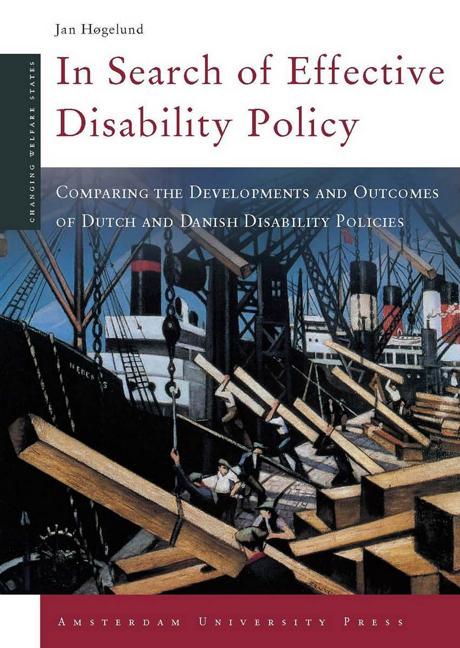 In Search of Effective Disability Policy
In Search of Effective Disability Policy Book contents
- Frontmatter
- Contents
- Acknowledgement
- 1 Disability Policies Under Pressure
- 2 The Integration of Disabled People:What Do We Know?
- 3 Bringing the Pieces Together:A Multidisciplinary Approach to Work Disability
- 4 Economic Miracles Bypassing Disabled People
- 5 Dutch Disability Reforms:Redefining Responsibilities
- 6 Danish Disability Policy:Small Steps,Big Change?
- 7 Different Routes to Integration
- 8 Different Policies – Different Outcomes
- 9 Too Much and Too Little:Employers’Responsibility in Denmark and the Netherlands
- Tables and Figures
- Notes
- References
- Index of Subjects
- Index of Names
1 - Disability Policies Under Pressure
Published online by Cambridge University Press: 15 January 2021
- Frontmatter
- Contents
- Acknowledgement
- 1 Disability Policies Under Pressure
- 2 The Integration of Disabled People:What Do We Know?
- 3 Bringing the Pieces Together:A Multidisciplinary Approach to Work Disability
- 4 Economic Miracles Bypassing Disabled People
- 5 Dutch Disability Reforms:Redefining Responsibilities
- 6 Danish Disability Policy:Small Steps,Big Change?
- 7 Different Routes to Integration
- 8 Different Policies – Different Outcomes
- 9 Too Much and Too Little:Employers’Responsibility in Denmark and the Netherlands
- Tables and Figures
- Notes
- References
- Index of Subjects
- Index of Names
Summary
Effective disability policies are increasingly important for the sustainability of modern welfare states. How policies influence employers and disabled people is crucial for nations succeed in integrating disabled people into the labour market. Policies maymotivate disabled people to participate actively in the labour market and provide them with skills and abilities that increase their employability. Policies also, in different ways and to varying degrees, motivate employers to employ disabled people. This may happen by demanding that employers have a certain number of disabled people in their staff, by forbidding the dismissal of sick-listed workers or by making it economically attractive to employ people with disabilities. By putting the focus on this last aspect, this book adds to the existing knowledge about the consequences of different disability policies. It outlines some of the different ways that disability policies influence employers, and how this in turn has important implications for the labour market attachment of disabled people.
Dutch and Danish disability policies are examples of two policies that rest on very different principles. In the Netherlands the responsibility for the integration of disabled people rests to a large extent on the individual employer. The policy not only gives employers huge incentives to limit work disability, it also legally requires employers to take on a considerable responsibility for the employment of disabled people. In Denmark employers are a protected species; they have almost no formal or economic responsibility for the integration of disabled people. Instead this responsibility rests with public authorities. This book analyses how differences in employers’ responsibilities translate into differences in employers’ costs, which in turn influences both how the integration of disabled people takes place and the chances for disabled people in the labour market. The main conclusion is that the Dutch policy reinforces the division between insiders and outsiders; it promotes the reintegration of sick-listed workers, but counteracts the integration of people without attachment to an employer. In contrast, the Danish policy facilitates the integration of disabled people without prior labour market attachment, but does not sufficiently support the reintegration in work of sick-listed workers. It is therefore argued that there is scope for improvement in both nations’ disability policies and thus that more disabled people could participate in working life.
- Type
- Chapter
- Information
- In Search of Effective Disability PolicyComparing the Developments and Outcomes of the Dutch and Danish Disability Policies, pp. 11 - 30Publisher: Amsterdam University PressPrint publication year: 2003


